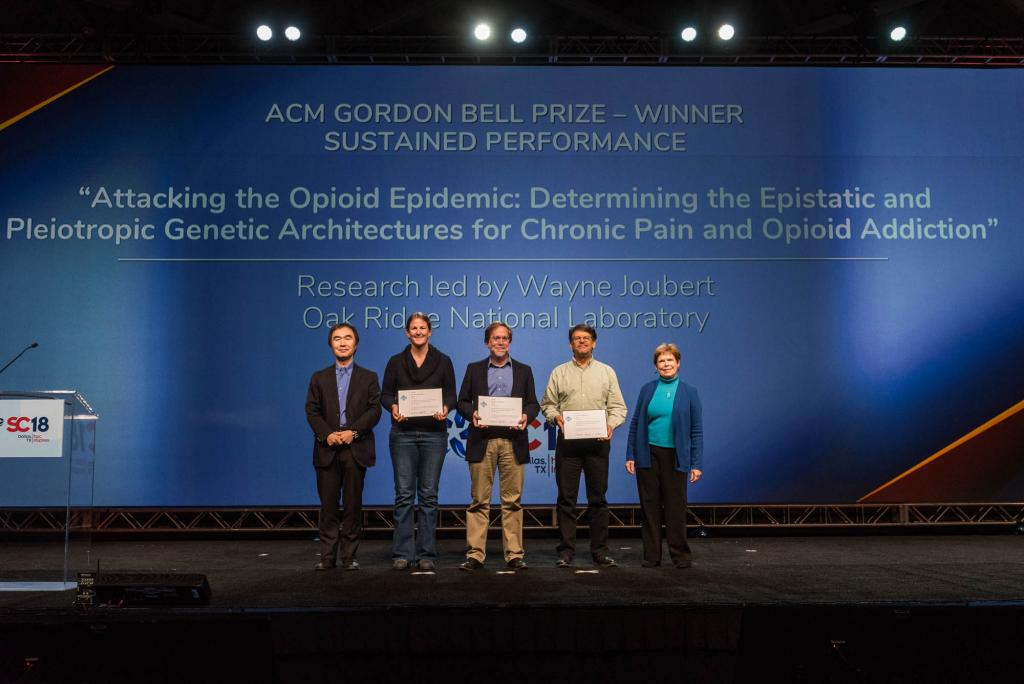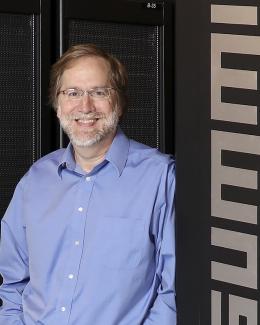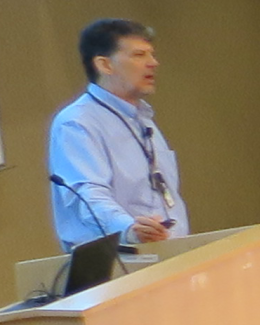
Two US Department of Energy (DOE) National Laboratories were recently awarded the 2018 Association for Computing Machinery’s (ACM’s) Gordon Bell Prize for work done on the Oak Ridge Leadership Computing Facility’s (OLCF’s) Summit supercomputer, the most powerful system in the world.
The annual Gordon Bell Prize recognizes outstanding achievement in high-performance computing. The winning teams were announced on November 15 during the 2018 International Conference for High Performance Computing, Networking, Storage, and Analysis, or SC18, in Dallas.
One of the winners, a team co-led by computational systems biologist Dan Jacobson and computational scientist Wayne Joubert of DOE’s Oak Ridge National Laboratory (ORNL), is leveraging population-scale genomic datasets and algorithmic advances to uncover hidden networks of genes at incredible speeds.
Jacobson and Joubert’s team developed a genomics algorithm capable of using mixed-precision arithmetic to attain exascale speeds. The team’s Combinatorial Metrics application was the first code in the world to break the exascale barrier. On Summit, the team’s application achieved a peak throughput of 2.36 exaops—or 2.36 billion billion calculations per second, the fastest science application ever reported.
“I am tremendously impressed with the quality of all six Gordon Bell Prize papers this year. The breadth of research topics with clear societal and science impact, as well as the advancement of simulation, data analysis, and AI techniques is unprecedented to my understanding of this prestigious prize,” said OLCF Director of Science Jack Wells. “It’s very satisfying to see the enthusiasm that these expert teams have for using Summit, and winning this award is a true testament to the innovation and dedication of our scientific user community.”
The OLCF, located at ORNL, debuted the 200-petaflop Summit system as the world’s fastest supercomputer in June, and it was again named No. 1 on the Top500 list on November 12. “Having Summit users win the Gordon Bell prize in this already noteworthy inaugural year is really the icing on the cake,” said Wells.
Jacobson’s work compares genetic variations within a population to uncover hidden networks of genes that contribute to complex traits. The team’s work could help inform treatment for patients predisposed to substance abuse and other conditions, including diabetes, heart disease, Alzheimer’s, and dementia, and could improve practices to prevent disease from occurring in the first place. One condition Jacobson’s team is studying is opioid addiction, which has been linked to the deaths of more than 49,000 people in the United States in 2017. Jacobson’s research into human genetics leverages algorithms first developed for bioenergy research to improve plant feedstocks for biofuels production.
The team’s prize-winning effort supports its work for the Center for Bioenergy Innovation (CBI) and the Plant Microbe Interfaces (PMI) project, a cross-disciplinary effort at ORNL. Both CBI and PMI are funded by DOE’s Biological and Environmental Research program.
Other key collaborators include the DOE Joint Genome Institute as well as the US Department of Veterans Affairs, which compiled one of the largest human genome datasets in the world under the Million Veteran Program, a voluntary research program focused on studying how genes affect health.
The 2018 Gordon Bell Prize winners at SC18. Credit: SC18.
The ORNL-led team shared this year’s Gordon Bell prize with a team led by computational scientists and engineers from Lawrence Berkeley National Laboratory, ORNL and NVIDIA; that team was recognized for applying an exascale-class deep-learning application to extreme climate data and breaking the exaop (1 billion billion calculations per second) computing barrier for the first time with a deep-learning application.
The team used Summit to apply deep-learning methods to extract detailed information from climate data produced at the National Energy Research Scientific Computing Center (NERSC). Rather than computing simple quantities such as average global temperature, these methods discover and locate features like hurricanes and atmospheric rivers, which are important in characterizing extreme weather patterns and their impact. Read more: http://cs.lbl.gov/news-media/news/2018/lawrence-berkeley-oak-ridge-national-labs-share-2018-acm-gordon-bell-prize/
Both NERSC and the OLCF are DOE Office of Science User Facilities.
Read more about Jacobson and Joubert’s science:
- https://www.olcf.ornl.gov/2018/10/15/computing-genes-to-support-living-clean/
- https://www.olcf.ornl.gov/2018/10/09/mixed-precision-a-strategy-for-new-science-opportunities/
UT-Battelle, LLC, manages ORNL for the Department of Energy’s Office of Science, the single largest supporter of basic research in the physical sciences in the United States. DOE’s Office of Science is working to address some of the most pressing challenges of our time. For more information, please visit https://www.energy.gov/science/.



